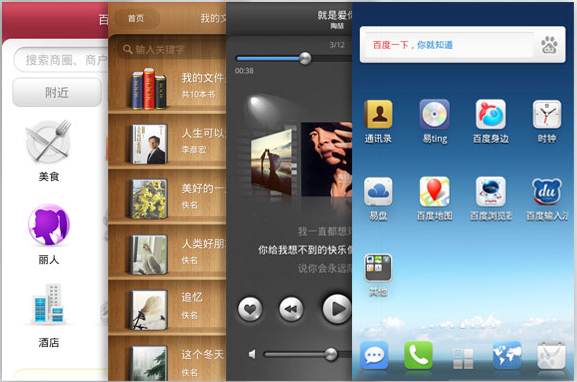Chinese search giant Baidu is reportedly developing a cloud-based smartphone platform in attempt to dip its toes into the mobile pool. Mobile internet users in China totaled 233 million in 2010, projected to reach 957 million by 2014. For some perspective, the total population of both the European Union and the United States was approximately 800 million last year. So in China, mobile is less of a pool and more of a vast ocean.
This should be interesting.
The company is calling its platform Baidu Yi, which translates to “Easy.” Similar to the Bing integration in Mango, this OS is all about search. Smartphones that run Yi will load up a search box within seconds of turning on the phone. Other components will load in the background, but users will be able to perform a web search almost instantly. The system will also offer up to 180 GB of cloud storage space. Sounds nice — but so did webOS. Will Baidu Yi fare better?
Baidu isn’t the only Chinese company looking to get in on the OS game. Local players like Hangzhou-based Alibaba and Shenzhen-based Huawei have announced similar cloud-based platforms recently, but as far as local competition is concerned, Baidu seems unfazed. “To us, cloud computing is much more natural than to an e-commerce company or a telecom equipment maker because we have the capability to handle data, just as Google has, that’s why they’re so good at it,” said Baidu VP Wang Jing to the Financial Times.
Baidu certainly has taken a page out of the Google playbook. But just one. The current version of Yi is based on Android, but the Android you’d see in China isn’t our Android. In most cases (not Baidu’s), it’s called Ophone, a fork of Android, and it effectively removes Google from the picture. The core Android operating system is made up of a Linux kernel, licensed under GPL, with Apache middleware and user stacks. Major components of the upper layers, such as the Android Market, are Google’s to license. Chinese carriers gladly do without those core Google software products and opt to integrate their own or third-party replacements.
In other words, Android’s success in China is a bit hollow, even if it is the basis for Ophone, and now Baidu Yi. What’s more, Mr. Wang mentioned that “it is possible that we [will] launch our own operating system in the future.” Google already has big problems in China, and Android getting left behind entirely (rather than marginally) by its biggest Chinese competitor would only make things worse.
But how does Mr. Wang feel about our other hometown hero — Apple. The company has already tapped China Unicom’s 184M subscribers, and reportedly has plans to launch the iPhone with China Mobile, which has a user base topping 930M as of August 29. Apple only has four (non-fake) Apple stores in the country, but China is its fastest growing market in terms of sales. With those stats, it hardly seems as though Baidu Yi poses a threat.
But nothing is ever as it seems. China is both an irresistible and incredibly dangerous market for American tech companies, and Apple faces a number of obstacles within the market. For one, the Chinese government requires special wireless internet technology (TD-SCDMA) on its mobile phones. And then there’s the massive black/grey market in China for iPhones and iPads.
Baidu’s co-founder and CEO seemed to know back in March that Apple would be one of its main competitors in the mobile space. In an interview with the Financial Times, Mr. Li made mention of the new OS as compared to iOS.
“Right now when you power on an iPhone, it takes 45 seconds before you can do anything,” he said. “In the future, one second, you turn on the device, and you can start using the box. That’s our mission for the future of the internet.” His plan is to build an OS that uses search as the basis for everything. “The goal is to let people become increasingly dependent on the Baidu Box.”
And that’s all we really need: to be even more dependent on our smartphones. Good work, Baidu.
Update: So it would seem that Baidu Yi has gone live. The OS features include an eBooks app called Yue, a Google-places style app called Shen Bian, Baidu-powered maps, and a music app called Ting. Check out the video after the jump to see Baidu Yi in action.
[Image credit: The Register]
[Video credit: MicGadget]

